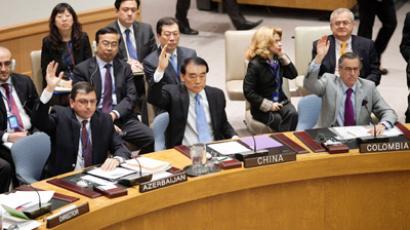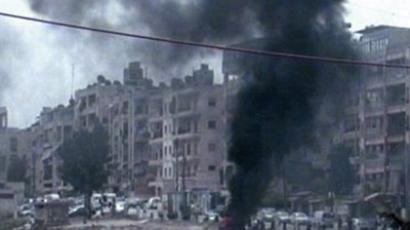'No side is interested in long-term ceasefire in Syria’
UN chief Ban Ki-moon has called for more peacekeepers and aircraft to be deployed in Syria to monitor the truce there. But are the major forces in the conflict really interested in a long-term ceasefire?
The proposed 250 observers to be sent to monitor the UN-Arab League-brokered ceasefire would "not be enough considering the current situation and the vastness of the country," UN Secretary-General Ban Ki-moon said on Tuesday. He noted that the ceasefire was being "generally observed" although there was still some violence.He also added that the UN was asking the EU to provide helicopters and planes for the operation, Reuters says. The ceasefire was brokered by joint UN-Arab League envoy Kofi Annan and began Thursday. It is part of a plan to launch talks between the regime of Bashar Assad and the opposition.But Prof. David Gibbs, a historian from the University of Arizona, is skeptical about the truce and believes that none of the major factions are interested in a long-term ceasefire.He claims there is not much resolve on the part of Western powers to make it stick. Despite the ceasefire the Western powers have mostly lost interest in the idea of negotiated settlements, Gibbs believes. “Since the end of the Cold War the United States and to some extent the NATO allies have seen the desirability of brute force instead of diplomacy. Diplomacy is often discouraged as an act of cowardice and ineffectual activity.”As for the rebels, they are committed to bringing the West into the conflict as combatants, which means they are not interested in a long-term ceasefire. They want to settle the crisis on the battlefield on the assumption that the West will enter the conflict.The fact also remains that the Syrian military has a certain tradition of ruthlessness, Gibbs notes.Meanwhile the US is pushing for more tough sanctions against Syria. “The tougher the better. We’ve said all along that we want to see sanctions, political pressure, economic pressure increased on Assad, increased on his regime,” US State Department spokesman Mark Toner said on Tuesday. “We would have the message conveyed very clearly to those around Assad that the tide has turned, and they need to reconsider their options,” he said.Meanwhile the US is pushing for more tough sanctions against Syria. “The tougher the better. We’ve said all along that we want to see sanctions, political pressure, economic pressure increased on Assad, increased on his regime,” US State Department spokesman Mark Toner said on Tuesday. “We would have the message conveyed very clearly to those around Assad that the tide has turned, and they need to reconsider their options,” he said.Prof. Gibbs warns that the outcome of the Syrian conflict could be far more complicated and destructive than was the case in the Libyan scenario.The US and its allies have committing their credibility and prestige to regime change in Syria, and should Bashar Assad’s regime prevail in spite of the sanctions and “non-lethal aid” to the rebels, the West will look weak and will try to escalate the conflict just to maintain US and NATO credibility, Gibbs concludes.














